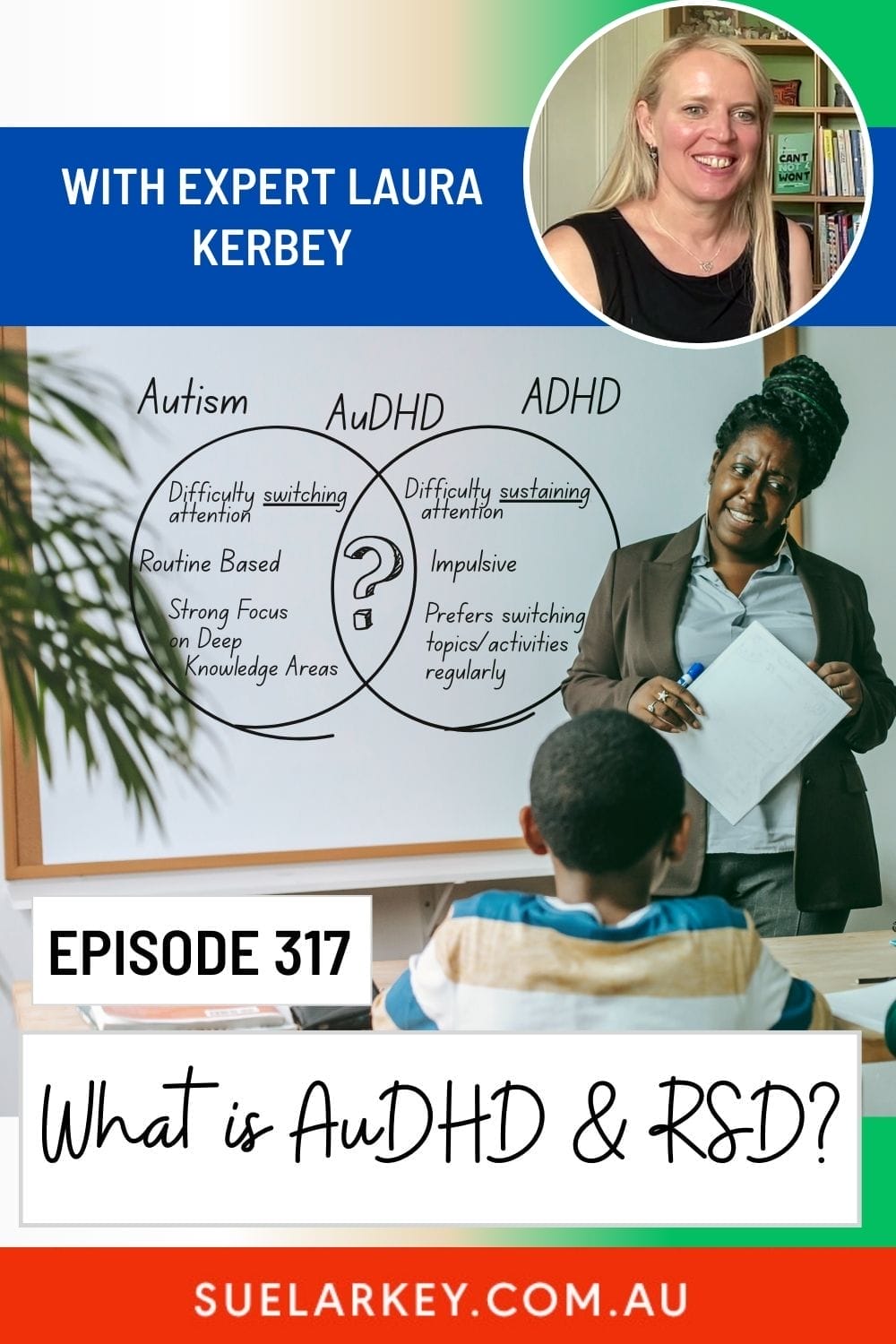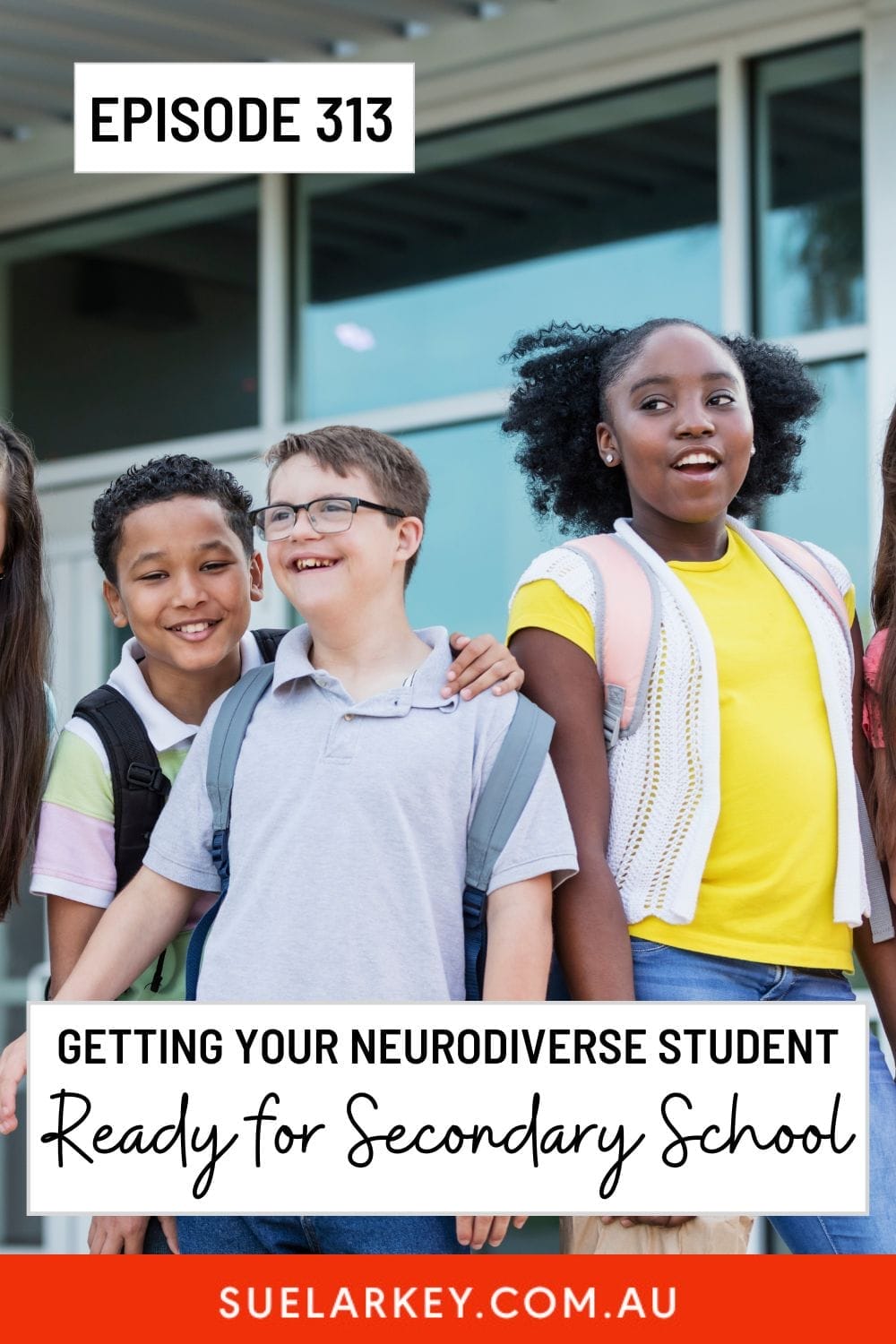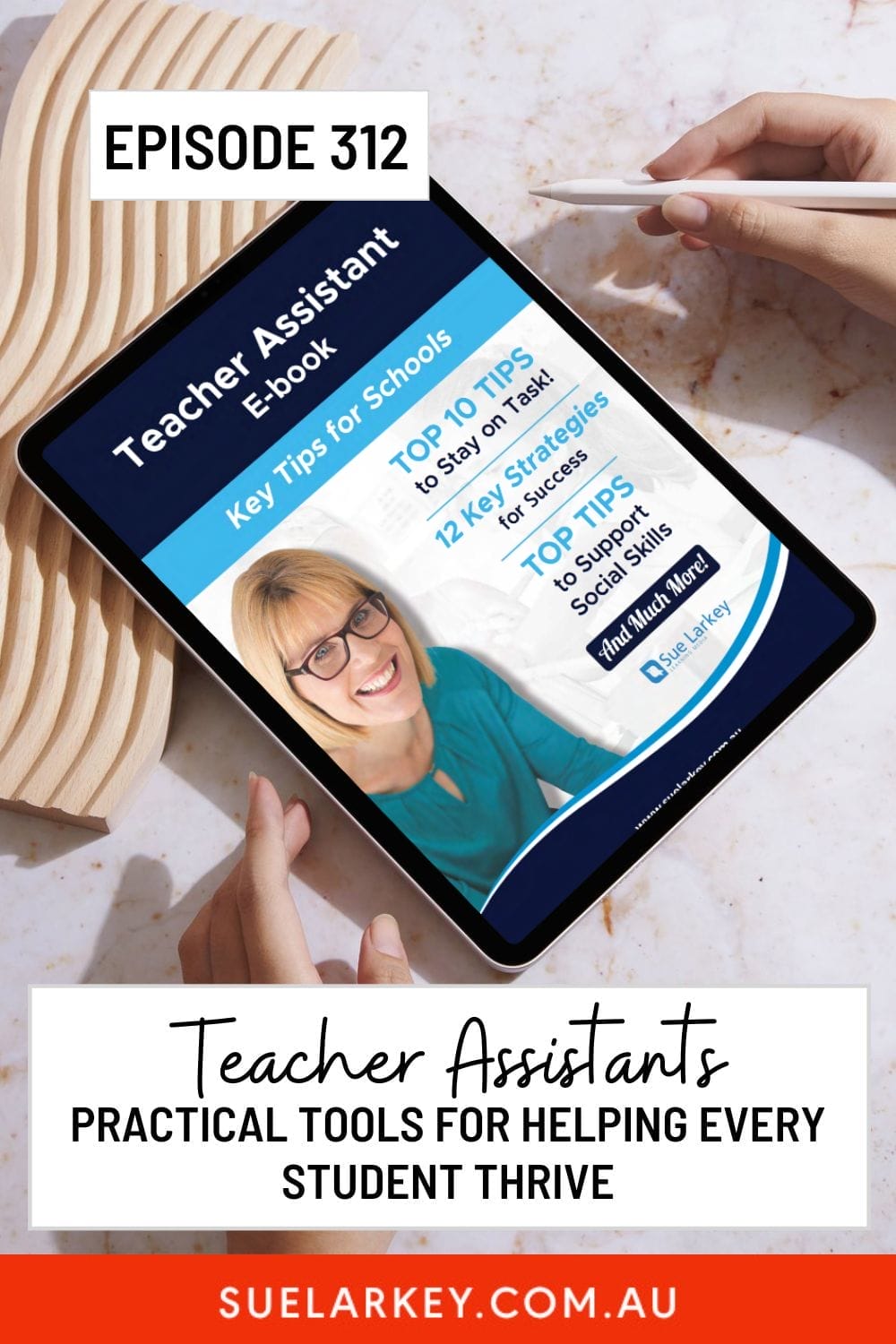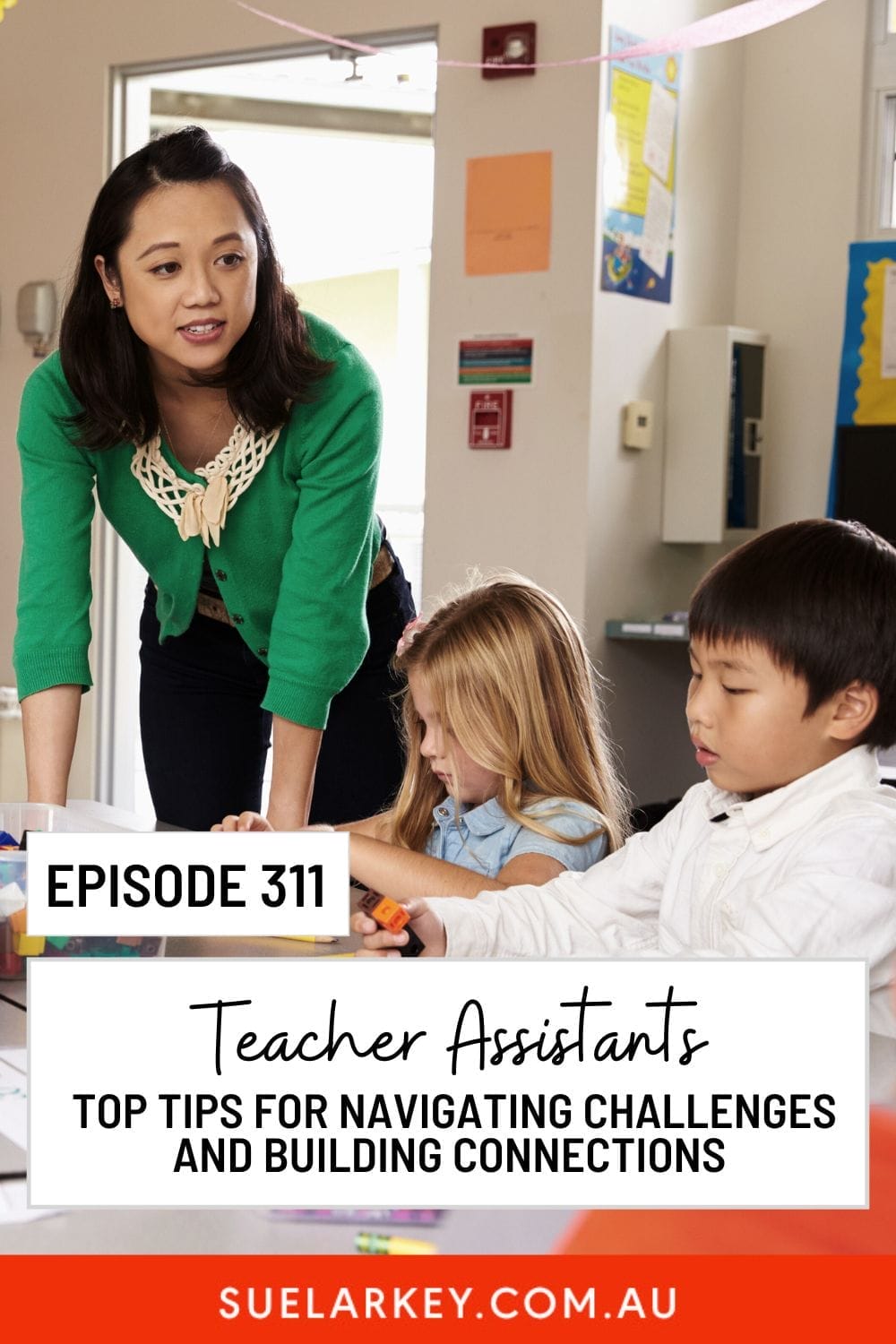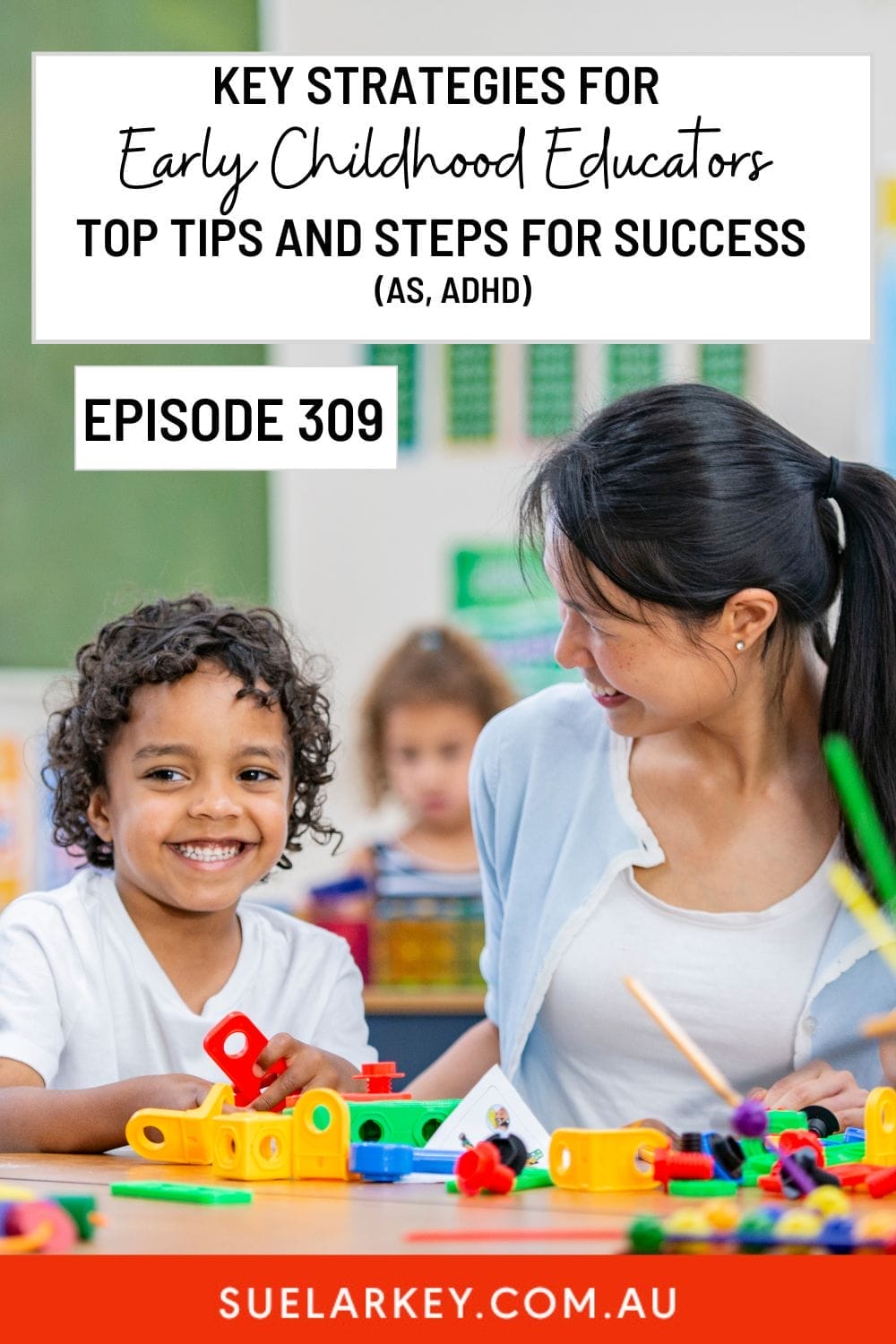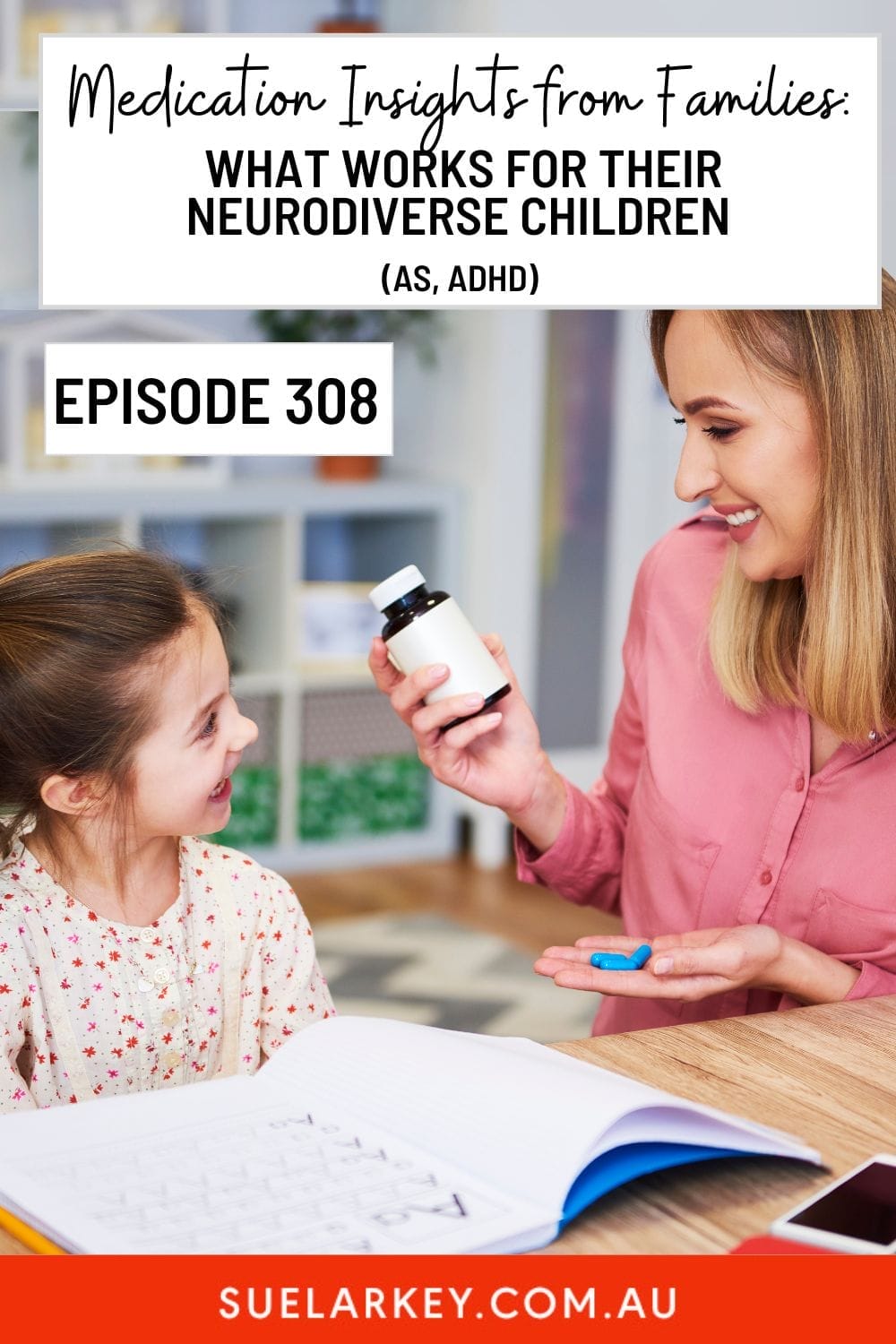Sue Larkey Blog
Helping you “Make a Difference”


Tips, Strategies, Time Savers and Inspiration to help make difference for a child with an ASD in your class, home or community.
What is AuDHD & RSD? With Expert Laura Kerbey (Episode 317)
What is AuDHD & RSD? With Expert Laura Kerbey AuDHD Classroom Strategies Teachers Discussed in this Podcast: ✅ Two-student demonstration technique: Have two children demonstrate tasks first (getting books, lining up) before asking the AuDHD student - provides visual guidance without direct demands. ✅ Flexible scheduling approach: Recognize AuDHD students need structure some days and spontaneity others - check in daily about their needs rather than rigid expectations. ✅ "Take the thought to court" strategy: When students experience RSD, ask "Where is the evidence?" to challenge negative assumptions about others' thoughts. ✅ Alternative perspective questioning: Ask "What else could the teacher have been thinking?" or "Who else could they have been looking at?" to combat RSD interpretations. ✅ Parent collaboration on expectations: Meet with parents at year's start to set realistic grade expectations (60% English, 80% History) to reduce perfectionism pressure. ✅...
Create Your Classroom Calm Corner: What actually Works When Setting Up Effective Break Spaces (Episode 316)
Create Your Classroom Calm Corner: What actually Works When Setting Up Effective Break Spaces Sensory Break Space Strategies ************************************** Join me for an upcoming Workshop: Sue Larkey Workshops Can't make these Workshop dates? Join me for a self-paced on-demand course: Sue Larkey On-Demand Workshops ************************************** This Weeks Podcast was Created after a Question from Trish: "I am currently in the middle of setting up a calm corner/area within my senior preschool room (4-5years) my kids understand that this area is to be used when they are feeling overwhelmed or just need a little break away. Would love for ideas on what I can add to this area" Discussed in this Podcast: ✅ The "Walk Don't Talk" strategy: Take dysregulated students for a fast-paced walk without asking questions or talking, allowing them to regulate without verbal pressure during survival mode. ✅ Token system for breaks: Give students physical tokens they can...
Practical Strategies for Executive Functioning Skills: Dean Beadle Shares his Lived Experience (Episode 315)
Practical Strategies for Executive Functioning Skills: Dean Beadle shares his Lived Experience Autistic Inertia Teaching Methods Strategies for Executive FunctioningKey takeaways from this podcast for educators and parents to understand Executive Functioning: ✅ Executive Functioning - "The Brain's Admin Team" it includes planning, organization, emotional regulation, pre-task preparation and management. ✅ Understanding Autistic Inertia. It includes difficulty shifting between tasks (start/stop). ✅ Understanding Autistic Inertia is not laziness or task avoidance. Learn more from Couse: Educators Guide to Executive Functioning. ✅"Autism plus environment equals outcome" and what you can to do to make environment more supportive (see Top Tips below) ✅ Focus on supporting rather than changing. Educators Guide to Executive Functioning include Exclusive Ebook with 100s of Accomodations & Adjustments to try. Enroll Now ✅ ”What's perfectly doable tomorrow, may be nigh on...
Executive Function Classroom Strategies – Breaking Through Autistic Inertia & ADHD Paralysis (Episode 314)
Breaking Through Autistic Inertia & ADHD Paralysis: The Executive Functioning Skills Students Need to Succeed executive function classroom strategies This Weeks Podcast...Understanding Executive Function Challenges in the ClassroomActionable Examples from the Podcast ✅ The Five-Minute Start Strategy - Set a timer for just five minutes and have students begin with the easiest part of the task. Once completed, they can choose to continue or take a break. ✅ Traffic Light Task System - Organise assignments using green (easy), yellow (medium), and red (difficult) coding. Students always start with green tasks to build momentum. ✅ Dopamine Boosters Before Work - Allow students to listen to gaming music, have a healthy snack, or share two fun facts about their special interest before starting tasks. ✅ Multi-Step Instruction Breakdown - Provide visual step-by-step instructions instead of verbal multi-step directions. Print or display each step clearly. ✅ Equipment Management...
Getting Your Neurodiverse Student Ready for Secondary School – Your Transition Guide (Episode 313)
Getting Your Neurodiverse Student Ready for Secondary SchoolYour Transition Guide Secondary School Transition StrategiesDiscussed in this Podcast: ✅ Start transition planning early, ideally in Year 5 ✅ Focus on the physical environment and sensory needs ✅ Develop social skills and strategies for peer interactions ✅ Empower students to problem-solve and self-advocate ✅ Consider the whole student experience, not just academics ✅ Adapt supports to be age-appropriate for teenagers And so much more!1. Must doThese are the MUST DO for Transition to Secondary School: Visit the school and walk around the buildings (video this to play back at home, completed by the student or parent) Locate the office where you go for assistance (important to use positive language e.g. when unsure someone will be able to assist) Speak with the year Co-ordinator for Year 7 about the daily routine and timetable cycle Obtain a map of the school layout with building names and numbers Obtain examples of...
Teacher Assistants Neurodiverse Support Strategies – Practical Tools for Helping Every Student Thrive (Episode 312)
Teacher Assistants Practical Tools for Helping Every Student Thrive Teacher Assistant Neurodiverse SupportDiscussed in this Podcast: ✅ Traffic Light Cup System: Use red, orange, and green plastic cups on desks - green means "I'm working well," orange/yellow means "I need help but can keep working," red means "I'm stopped and can't continue." ✅ Red Pen Signal for Secondary: In secondary school, place a red pen at the front of the desk to signal need for help without raising hands and drawing attention. ✅ See Two, Then See Me: Teach students to ask two peers for help before coming to the teacher assistant, building peer connections and independence. ✅ Timer for Wait Times: Tell students "I'll be there in five minutes," set a timer, and honor that commitment to reduce anxiety about waiting. ✅ Highlighter Differentiation: Use green highlighter for tasks to do first, red for tasks to skip, and orange for tasks to attempt - starting with green builds confidence. ✅ Number...
Teacher Assistants – Top Tips for Navigating Challenges and Building Connections – Insights from Dream Team (Lived Experience, Teacher, Teacher Assistant & Parent) (Episode 311)
Teacher Assistants Top Tips for Navigating Challenges and Building Connections Insights from Dream Team (Lived Experience, Teacher, Teacher Assistant & Parent) Learn Teacher Assistant Classroom Strategies Teacher Assistant Success Strategies Discussed in this Episode: ✅ Signal System for Secondary Students: Dean's TA would sit at the back of the room with a signal system where he'd scratch his head or tap, and she would come check on him, but would stop at other kids on the way, making support less obvious. ✅ Facilitating Peer Connections: When a child asked the TA how to do a math equation, she would say "Dean knows how to do it. Dean will show you", creating positive social connections between students. ✅ Building Visual Context: Dean taught a student to tie shoelaces on green carpet in the classroom, but the student couldn't do it at home on tiles - teach skills in multiple settings. ✅ Red Pen Signal: Put a red pen out on the table as a signal for when help is...
Early Childhood Mini Training & Ebook to Download (Episode 310)
Early Childhood Mini Training & Ebook to Download Learn Early Childhood Tips and Strategies Today!Join Sue for an upcoming Live Virtual Workshop where you will learn Sue's practical tips & strategies to make a difference.Over 400 Early Child Educators told me their top 2 questions they wanted answered, and I used those to create these Tips & Strategies What you will learn: ✅ Perfect Camera Moment Teaching: "When you take a photo one second before you could have had a horrible face, one second after you could have had a horrible face. You've gotta find that sweet spot." ✅ Four Teaching Approaches: Direct teaching (one-on-one quiet environment), engineered situations (setting up pointing opportunities at eating time), incidental teaching (daily opportunities), and making it fun with animation. ✅ Backward Training Success: "If you're teaching a child to put their shoes on, you might actually put the whole shoe on, and all they have to do is one Velcro." ✅ Clear Lunchbox...
Key Strategies for Early Childhood Educators – Top Tips and Steps for Success (Episode 309)
Key Strategies for Early Childhood Educators - Top Tips and Steps for Success Teaching Pointing Neurodiverse ChildrenDiscussed in this Episode: ✅Hand-Over-Hand Pointing Practice: "Say your child wants barbecue shapes, you just proactively put their hand, your hand over theirs, point with their finger to the barbecue shapes." ✅Drawing Progression Books: "We've got these little how to draw a house, you know, how to draw a person... Laminate them, cut them up, spiral bound them... they show them step by step, how to draw something." ✅Help Sign with Objects: "If they need help, have a visual for help. They need to hand to you or the scissors to ask for the scissors to cut it or open." ✅Sitting Variation Teaching: "There's to sit in a chair, there's to sit on the floor, there's to sit on the carpet, to sit on cold concrete... sitting on a bench seat outside to eat sometimes in a preschool compared to sitting at a chair at a table." ✅WhatsApp Documentation System: "Take a photo of the...
Medication Insights from Families: What works for their Neurodiverse Children (AS, ADHD) (Episode 308)
Medication Insights from Families: What works for their Neurodiverse Children (AS, ADHD) (Episode 308) Medication for Neurodiverse ChildrenI am not a Dr or Specialist, but as a teacher/educator, it is important we understand different medications. In this Podcast on Medicating and Neurodiversity: ✅ Keep a medication diary - Document changes in behavior, sleep patterns, and focus to track medication effectiveness over time using voice memos or quick texts. ✅ Create a team approach - Include teachers, parents, pediatricians, psychologists, dance teachers, and music therapists in observations to get a complete picture of the child's needs. ✅ Monitor physical changes - Watch for weight gain, blood pressure changes, sensory processing increases, or appetite suppression as potential side effects. ✅ Trial different medications - Don't stop at the first medication; parents in the podcast tried 3-4 different options before finding the right fit. ✅ Use the "medical condition" comparison -...
Episode 307: Everything you need to know about PDA – Insights & Tips from Laura Kerbey
Everything you need to know about PDA - Insights & Tips from Educator PDA classroom strategies podcastStrategies for Teaching PDA StudentsKey takeaways from this podcast for educators and parents/ carers of a child with PDA:✅Build trust and connection with the student, as this is crucial for those with PDA. ✅Offer choices and autonomy within the needed structure and routine. ✅Use indirect language and avoid direct demands. ✅Be authentic and treat the student as an equal. ✅Show interest in the student's special interests. ✅Learn together with the student in a reciprocal way. ✅Allow flexibility in seating, grouping, and task choices. ✅Anticipate and discuss challenges together, like using the bathroom at school. ✅Mix up your strategies since PDA students are smart and strategies wear out quickly. ✅Most importantly, see the positives in these creative, imaginative students.Pathological Demand Avoidance (PDA) in the Classroom: Understanding and Teacher Strategies for EducatorsPDA...
Do I have a child with ODD & PDA? What is it and What to do (Episode 306)
Do I have a child with ODD & PDA? What is it and What to do. What is ODD and PDA? This week's podcast I discuss ODD and PDA, and tips and strategies that can help understand challenging behaviour! Not sure what ODD and PDA are? Listen to this weeks episode for some insight OR Click here to read about it! Discussed in this Episode ✅ Night-Before Planning: Let students choose their next day's activities the evening before and make a video on their phone saying "tomorrow morning, I'm gonna come in and do this, this, and this." ✅ Flexible Work Locations: Offer students choices of where to work - "at the table or under the table," "on the mat or in the corridor," or "in my classroom or in the principal's classroom." ✅ Disguised Learning Through Leadership: Make ODD students helpers - have them mark other students' spelling tests (while learning spelling themselves) or help younger students read (while practicing their own reading). ✅ Indirect Praise Technique: Instead of...
